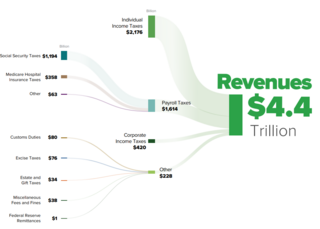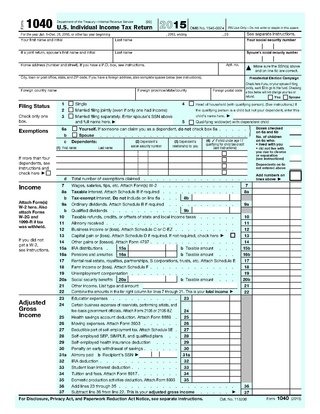
The United States has separate federal, state, and local governments with taxes imposed at each of these levels. Taxes are levied on income, payroll, property, sales, capital gains, dividends, imports, estates and gifts, as well as various fees. In 2020, taxes collected by federal, state, and local governments amounted to 25.5% of GDP, below the OECD average of 33.5% of GDP.
A tax deduction or benefit is an amount deducted from taxable income, usually based on expenses such as those incurred to produce additional income. Tax deductions are a form of tax incentives, along with exemptions and tax credits. The difference between deductions, exemptions, and credits is that deductions and exemptions both reduce taxable income, while credits reduce tax.
Under United States tax law, itemized deductions are eligible expenses that individual taxpayers can claim on federal income tax returns and which decrease their taxable income, and are claimable in place of a standard deduction, if available.
A pay-as-you-earn tax (PAYE), or pay-as-you-go (PAYG) in Australia, is a withholding of taxes on income payments to employees. Amounts withheld are treated as advance payments of income tax due. They are refundable to the extent they exceed tax as determined on tax returns. PAYE may include withholding the employee portion of insurance contributions or similar social benefit taxes. In most countries, they are determined by employers but subject to government review. PAYE is deducted from each paycheck by the employer and must be remitted promptly to the government. Most countries refer to income tax withholding by other terms, including pay-as-you-go tax.
A tax file number (TFN) is a unique identifier issued by the Australian Taxation Office (ATO) to each taxpaying entity—an individual, company, superannuation fund, partnership, or trust. Not all individuals have a TFN, and a business has both a TFN and an Australian Business Number (ABN). If a business earns income as part of carrying on its business, it may quote its ABN instead of its TFN.
A corporate tax, also called corporation tax or company tax, is a type of direct tax levied on the income or capital of corporations and other similar legal entities. The tax is usually imposed at the national level, but it may also be imposed at state or local levels in some countries. Corporate taxes may be referred to as income tax or capital tax, depending on the nature of the tax.

A permanent account number (PAN) is a ten-character alphanumeric identifier, issued in the form of a polycarbonate card, by the Indian Income Tax Department, to any person who applies for it or to whom the department allots the number without an application. It can also be obtained in the form of a PDF file known as an e-PAN from the website of the Indian Income Tax Department.
A tax refund is a payment to the taxpayer due because the taxpayer has paid more tax than owed.
Tax withholding, also known as tax retention, pay-as-you-earn tax or tax deduction at source, is income tax paid to the government by the payer of the income rather than by the recipient of the income. The tax is thus withheld or deducted from the income due to the recipient. In most jurisdictions, tax withholding applies to employment income. Many jurisdictions also require withholding taxes on payments of interest or dividends. In most jurisdictions, there are additional tax withholding obligations if the recipient of the income is resident in a different jurisdiction, and in those circumstances withholding tax sometimes applies to royalties, rent or even the sale of real estate. Governments use tax withholding as a means to combat tax evasion, and sometimes impose additional tax withholding requirements if the recipient has been delinquent in filing tax returns, or in industries where tax evasion is perceived to be common.

The United States federal government and most state governments impose an income tax. They are determined by applying a tax rate, which may increase as income increases, to taxable income, which is the total income less allowable deductions. Income is broadly defined. Individuals and corporations are directly taxable, and estates and trusts may be taxable on undistributed income. Partnerships are not taxed, but their partners are taxed on their shares of partnership income. Residents and citizens are taxed on worldwide income, while nonresidents are taxed only on income within the jurisdiction. Several types of credits reduce tax, and some types of credits may exceed tax before credits. Most business expenses are deductible. Individuals may deduct certain personal expenses, including home mortgage interest, state taxes, contributions to charity, and some other items. Some deductions are subject to limits, and an Alternative Minimum Tax (AMT) applies at the federal and some state levels.
Tax deduction at source (TDS) is an Indian withholding tax that is a means of collecting tax on income, dividends, or asset sales by requiring the payer to deduct tax due before paying the balance to the payee.
The United States Internal Revenue Service (IRS) uses forms for taxpayers and tax-exempt organizations to report financial information, such as to report income, calculate taxes to be paid to the federal government, and disclose other information as required by the Internal Revenue Code (IRC). There are over 800 various forms and schedules. Other tax forms in the United States are filed with state and local governments.

Corporate tax is imposed in the United States at the federal, most state, and some local levels on the income of entities treated for tax purposes as corporations. Since January 1, 2018, the nominal federal corporate tax rate in the United States of America is a flat 21% following the passage of the Tax Cuts and Jobs Act of 2017. State and local taxes and rules vary by jurisdiction, though many are based on federal concepts and definitions. Taxable income may differ from book income both as to timing of income and tax deductions and as to what is taxable. The corporate Alternative Minimum Tax was also eliminated by the 2017 reform, but some states have alternative taxes. Like individuals, corporations must file tax returns every year. They must make quarterly estimated tax payments. Groups of corporations controlled by the same owners may file a consolidated return.
Challan or Chalan is a common Hindi word that has become an Indian English technical word used officially in many professional, especially financial transactions. It usually means an official form or receipt of acknowledgement or other kind of proof document, piece of paperwork, police citation, etc. According to American Merriam-Webster Dictionary "Chalan" means voucher or invoice. Similarly, British-English Dictionary Lexico also defines Challan as noun, "an official form or document, such as a receipt, invoice, or summons", and verb, "issue (someone) with an official notice of a traffic offence" and gives several examples of their applications, which are also paralleled by the Oxford Learner's Dictionary's two separate entries on the same. Wiktionary also gives examples of the application of the word challan in southeast Asia, including its use as a verb with challaning and challaned used similarly in context and meaning to police ticketing or someone being ticketed. While most of the dictionaries talk about the meaning representing a monetary penalty which is true in most real cases, Collins English Dictionary goes one step further and defines the verb part of the meaning of Chalan as "verb (transitive), to cause to appear before a magistrate", which in reality happens only in a subset of cases of Challan when a person misses paying the Challan and the matter moves to the next step of receiving a summon from a court.
Taxes in Germany are levied at various government levels: the federal government, the 16 states (Länder), and numerous municipalities (Städte/Gemeinden). The structured tax system has evolved significantly, since the reunification of Germany in 1990 and the integration within the European Union, which has influenced tax policies. Today, income tax and Value-Added Tax (VAT) are the primary sources of tax revenue. These taxes reflect Germany's commitment to a balanced approach between direct and indirect taxation, essential for funding extensive social welfare programs and public infrastructure. The modern German tax system accentuate on fairness and efficiency, adapting to global economic trends and domestic fiscal needs.

A tax return is a form on which a person or organization presents an account of income and circumstances, used by the tax authorities to determine liability for tax.
Indian tax forms are used to document information in compliance with the Income Tax Act of 1961 and in accordance with the Income Tax Rules, which govern the process of filing income tax returns in India.
Profession tax is the tax levied and collected by the state governments in India. It is a direct tax. A person earning an income from salary or anyone practicing a profession such as chartered accountant, company secretary, cost accountant, Software Engineer, lawyer, doctor etc. are required to pay this professional tax. Different states have different rates and methods of collection. In India, profession tax is imposed every month. However, not all states impose this tax. The states which impose professional tax are Karnataka, Bihar, West Bengal, Andhra Pradesh, Telangana, Maharashtra, Tamil Nadu, Gujarat, Assam, Kerala, Meghalaya, Odisha, Tripura, Madhya Pradesh, Jharkhand and Sikkim, Mizoram. Business owners, working individuals, merchants and people carrying out various occupations come under the purview of this tax.

Income tax return is the form in which assesses file information about his/her income and tax thereon to Income Tax Department. Various forms are ITR 1, ITR 2, ITR 3, ITR 4, ITR 5, ITR 6 and ITR 7. When you file a belated return, you are not allowed to carry forward certain losses.

Protean eGov Technologies Limited is an Indian technology company headquartered in Mumbai. The company focuses on developing digital public infrastructure (DPI) and e-governance initiatives for various governmental bodies in India. It works with central and state governments across multiple sectors including Tax Services, Social Security and Welfare, ID and Data Stack, Open Digital Ecosystem, and Cloud. In 2011, the company was appointed as a registrar for the Unique Identification Authority of India (UIDAI) to issue Aadhaar numbers to residents of the country.






